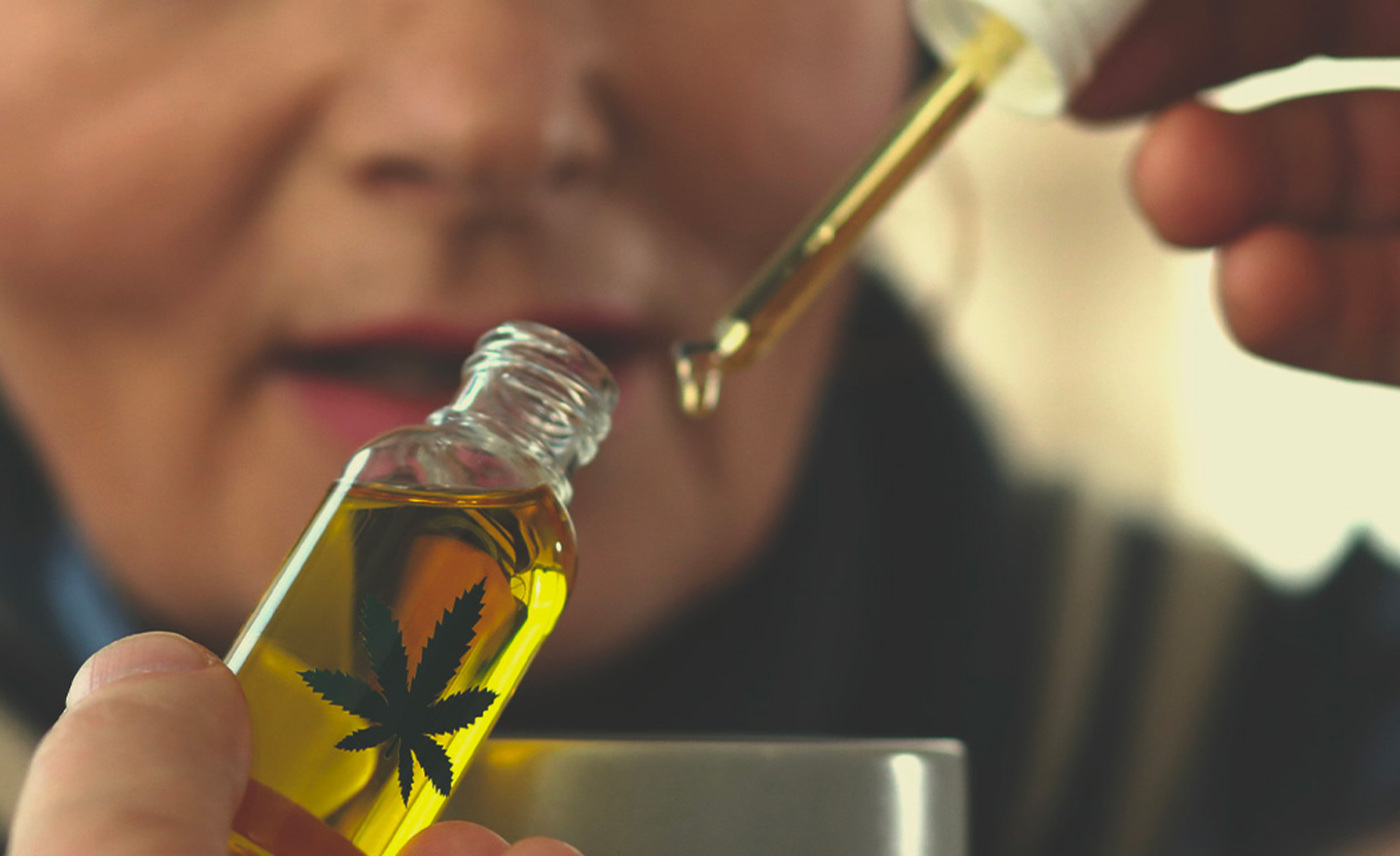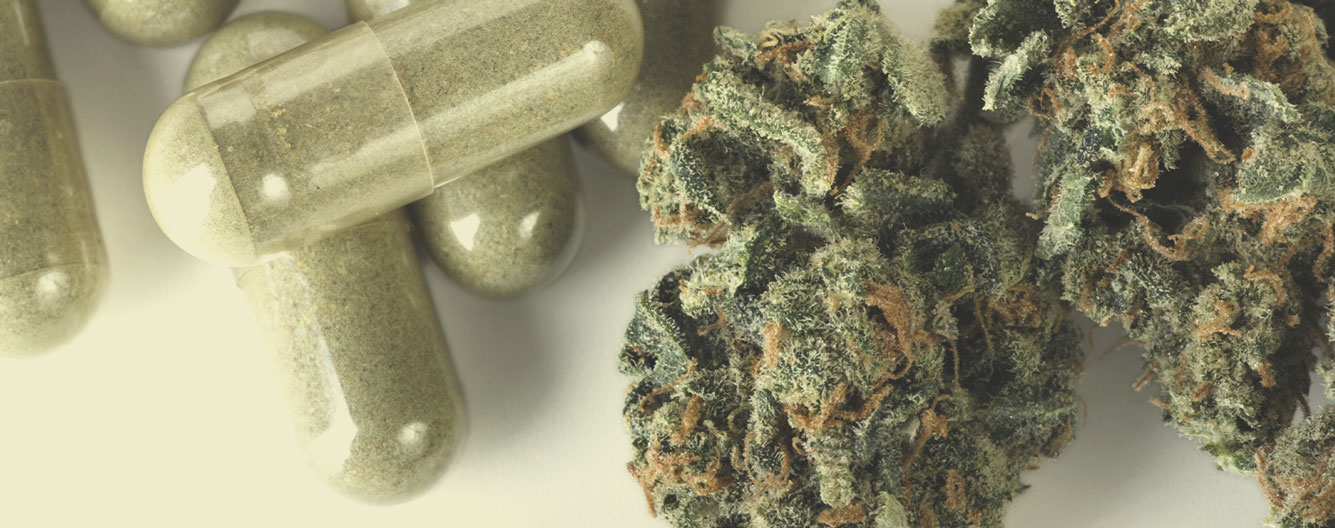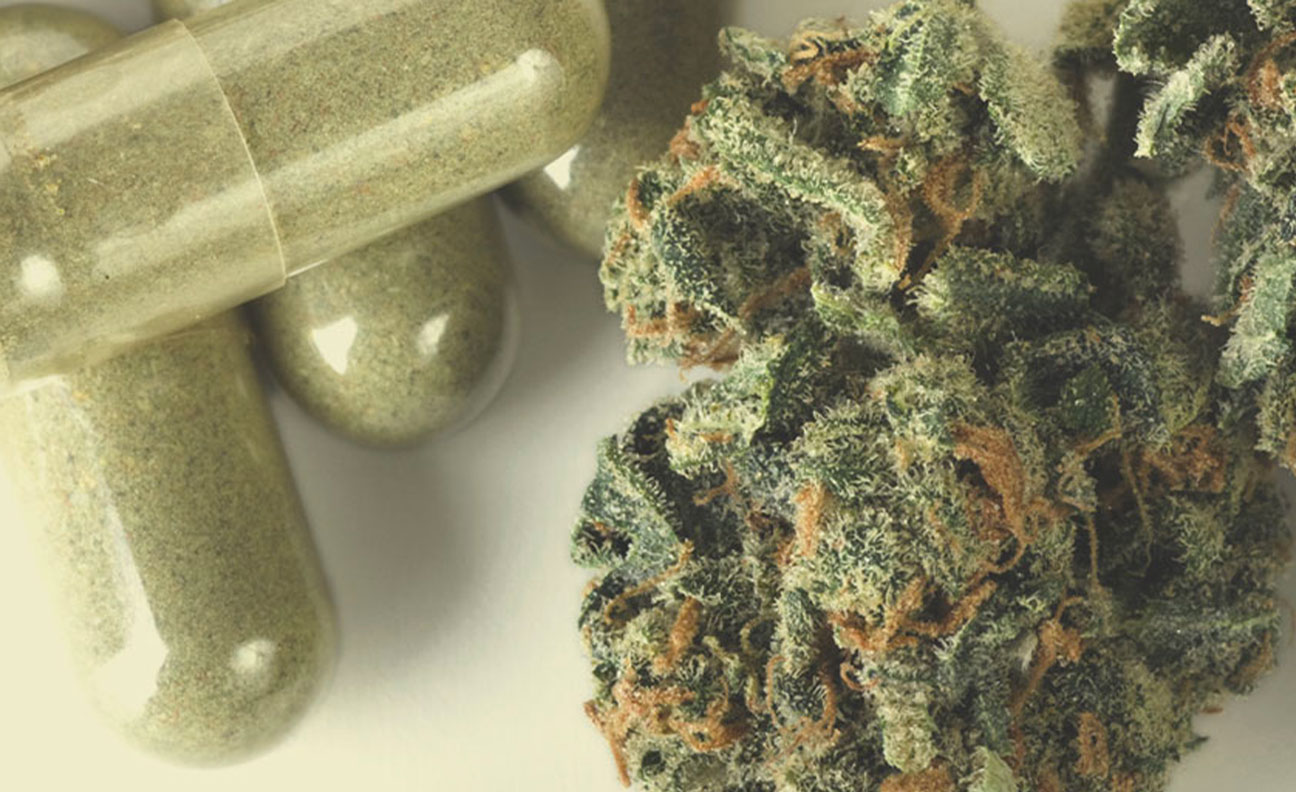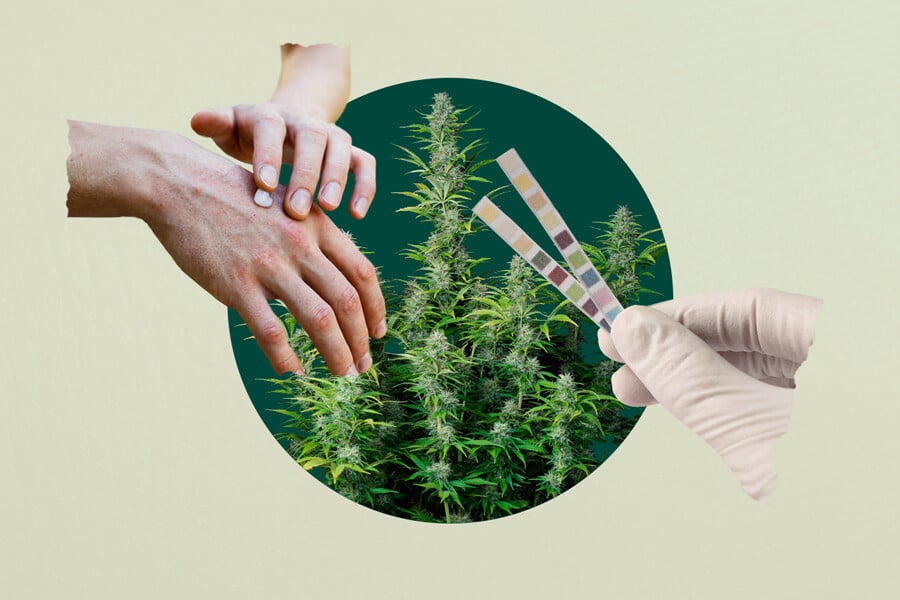.

Does Marijuana Work as a Substitute for Other Drugs?
Millions of people across the world are facing addiction in one form or another. For some, it manifests as opioid addiction, whereas others become dependent on alcohol and sleeping pills. Some patients find success in quitting cold turkey, but others find it easier to cut their habit using a substitute substance. So, how does cannabis fare here?
Contents:
Drug addiction continues to run rampant across the world. A staggering 2% of the world population[1] (around 158 million people) experiences addiction to alcohol, prescription drugs, or other substances—an issue that results in 1.5% of the global disease burden. The debate revolving around addiction features several schools of thought; some claim it arises from purely chemical grounds, while others point to underlying psychological issues including trauma.
Treatment approaches also vary. Some struggling drug users find relief in going cold turkey in rehab centres, whereas others achieve success by replacing more addictive and harmful drugs with less dangerous substitutes.
Researchers are currently exploring the potential of cannabis as a substitute for myriad substances, including opioids, nicotine, and alcohol. But the plant often gets labelled as a “gateway drug”—a substance that introduces people to drug use and leads them down a path to harder and more addictive substances.
However, emerging findings in this field are revealing that, under the correct circumstances, the opposite may be true.
What Drives Drug Users to Opt for Cannabis as a Substitute?
If you know a thing or two about cannabis research, you’ll be well-aware of the lack of human trials. Decades of prohibition and legal restrictions surrounding the herb mean it’s still hard to study the plant’s effects in a controlled setting. We’re not at the point where many clinics are providing patients with cannabis to replace problematic substances, partly because conclusive evidence for doing so doesn’t exist.
However, researchers can conduct epidemiological research (the broad study of populations) and harness the subjective experiences of members of specific groups to gain valid insights. A 2015 paper[2] published in the journal Drug and Alcohol Review took this approach in an attempt to understand what motivated drug users to self-administer cannabis in order to get off harder drugs.
The researchers recruited 97 “Baby Boomers” (people born between 1946–1964) from the Bay Area in San Francisco and conducted a questionnaire, health survey, and audio recording with each participant. The group gave varying responses as to why they chose to autumn back onto cannabis. Some members suggested that cannabis has less of an association with violent crime and helps to reduce bad tempers. Others stated that, in their view, the herb has a better safety profile than other drugs.
Interestingly, some users said that by substituting other drugs for cannabis, they’re still able to live a colourful and exciting life. They viewed this as favourable compared to the rigid “clean and sober” approach of Narcotics Anonymous.
This piece of research provides an interesting peek into the perceptions of those that elect to use cannabis as a substitute. But what does the science say when comparing cannabis to other drugs as a viable substitute to manage withdrawal and the symptoms of health conditions?


Is Cannabis Responsible for Reducing Painkiller Deaths in the United States?
Opioids are some of the most effective painkillers available. Although they work well at reducing discomfort, they pose a high risk of addiction. This class of drugs has a powerful effect on the reward centres of the brain and triggers the release of endorphins—feel-good hormones that give rise to sensations of pleasure and well-being. Unfortunately, overprescription of these painkillers has led to an opioid crisis[3]. In the United States, physicians dished out a massive 250 million prescriptions in 2015 alone.
According to Centres for Disease Control (CDC) data, over 760,000 people have died from a drug overdose since 1999, and opioids contributed to two-thirds[4] of these fatalities. Additionally, over 10 million citizens aged 12 and older misused opioids during 2019.
Although cannabis remains illegal at a federal level in the US, 36 states have legalized the plant for medical use, and doctors are able to prescribe the herb for numerous conditions.
So, can marijuana help with the opioid crisis? And what’s the deal with painkillers and weed? Interestingly, since the advent of legal cannabis, opioid deaths have plummeted by up to 25% in some states. Research[5] published in JAMA Internal Medicine documents an analysis of cannabis law and state-level death certificates in the US between 1999–2010. The results demonstrated significantly lower state-level deaths tied to opioid use in states with legalized medical marijuana.
The researchers point to several possible reasons for this trend. First, they note that around 60% of overdoses occur in patients with legitimate prescriptions. They argue that these same patients, with access to medical cannabis, may have chosen to opt for the herb if given the chance.
Second, medical cannabis laws likely led to a reduction in polypharmacy (the regular use of at least five medications), and thus decreased opioid deaths. The combination of benzodiazepines and opioids, in particular, can lead to excess sedation and suppression of breathing.
Finally, the authors question the role of cannabis when it comes to opioid withdrawal. If the herb helps patients reduce their intake, they’re more likely to break the cycle and discontinue their use of opioids when appropriate.
However, more recent findings[6] point toward a trend that shows the reverse, and thus we should remain sceptical that cannabis reduces opioid-related deaths.


Which Drugs Is Cannabis a Substitute For?
Opioids have a massive potential for abuse and a poor safety profile, especially when overprescribed. However, they’re clearly not the only drugs that cause issues with addiction across the world. Below, we delve into three other substances that are infamous for their addictive properties, and find out if cannabis can act as a suitable substitute.
Alcohol
As the heaviest-drinking region on Earth, over one-fifth of the population of Europe aged 15 and over reports drinking large amounts of alcohol at least once per week. During 2019, one in every twelve people within the EU consumed alcohol on a daily basis[7]. Although binge drinking takes a significant toll on health, drinking lower volumes more frequently also has a detrimental effect.
Does cannabis have the ability to help curb alcohol use in those open to using it as a substitute? Researchers are keen to find out. A study published in the journal Alcohol and Alcoholism assessed if cannabis can play the role of a “substitute medication”. Substances that autumn into this category must meet a certain criteria[8], which includes:
- They must reduce alcohol use and related harms
- Any misuse should be less of that of alcohol
- It should be safer in regard to overdose
- It should be less harmful than alcohol
Cannabis ticks almost all of the criteria of a suitable substitute, but the researchers state that more research and improved study designs are needed to find out how effectively it works.
Nicotine
Nicotine functions as a means of deterring herbivores in plants, but it acts as both a stimulant and a depressant in humans, and has a huge potential for abuse. Nicotine stands as the second-leading cause of death[9] across the world, and cigarette smoking results in over 48,000 deaths annually in the US alone. Consuming cannabis and nicotine largely involves smoking, but can the former scratch the itch caused by the latter? A 2021 paper[10] published in the Journal of Substance Abuse Treatment shows promise. Similar to the reduction in opioid intake following legal cannabis reform in the US, cannabis also seems to have had an impact on tobacco smoking.
The researchers used an online cross-sectional survey to question 2,102 cannabis users on how cannabis impacted their use of other substances. Among the group, 650 were current or former tobacco users. Of these, 320 reported reduced tobacco use after they started to use cannabis.
However, human trials are needed to see if cannabis truly works in this context. Population studies are notoriously unreliable, and subjective questionnaires don’t reflect reality entirely. Researchers are also keen to find out what about cannabis could make it effective here. Ongoing studies[11] are testing cannabis constituents such as beta-caryophyllene against models of nicotine addiction in animals.


Sleeping Pills
Sleeping pills such as benzodiazepines are also addictive for some people. For this reason, research recommends taking as little a dose as possible for the shortest duration possible. Patients are also advised against stopping their intake abruptly. Instead, they’re instructed to gradually reduce their dose to avoid potentially dangerous withdrawal symptoms.
Around 1 in 10 adults in the UK regularly takes sleeping pills to help them nod off. However, dosage guidelines mean they can only benefit from these substances for a short period of time. Could cannabis step in as a substitute? Unfortunately, this area remains severely understudied. While human trials exist that compare the two, researchers are trying to work out how cannabis affects sleep. For example, a study[12] published in 2019 looked at how CBD and THC impact circadian rhythm—the biological clock that dictates the sleep-wake cycle.
Cannabis: Gateway Drug or Substitute?
So, does cannabis lead people toward harder drugs, or away from them? Without sufficient data from clinical trials, we can’t give you an answer. However, some of the fears about cannabis as a gateway drug are overblown, and certain research draws associations between access to cannabis and less reliance on hard drugs. With that said, some data show that cannabis may lead adolescents toward opioid use[13], and cannabis use disorder[14] is a real condition that impacts many lives.
As always, it pays to be cautious. That said, it’s widely agreed that cannabis deserves significantly more study in this area, as drug and alcohol addiction is a serious global health issue.
- Drug Use - Our World in Data https://ourworldindata.org
- A safer alternative: Cannabis substitution as harm reduction https://onlinelibrary.wiley.com
- Overprescribing is major contributor to opioid crisis | The BMJ https://www.bmj.com
- Opioid Crisis Statistics | HHS.gov https://www.hhs.gov
- Medical Cannabis Laws and Opioid Analgesic Overdose Mortality in the United States, 1999-2010 | Adolescent Medicine | JAMA Internal Medicine | JAMA Network https://jamanetwork.com
- Association between medical cannabis laws and opioid overdose mortality has reversed over time | PNAS https://www.pnas.org
- Alcohol consumption statistics - Statistics Explained https://ec.europa.eu
- Can Cannabis be Considered a Substitute Medication for Alcohol? - PMC https://www.ncbi.nlm.nih.gov
- Nicotine Addiction: Practice Essentials, Background, Pathophysiology https://emedicine.medscape.com
- Self-reported reductions in tobacco and nicotine use following medical cannabis initiation: Results from a cross-sectional survey of authorized medical cannabis patients in Canada https://www.sciencedirect.com
- β-Caryophyllene, a dietary terpenoid, inhibits nicotine taking and nicotine seeking in rodents https://bpspubs.onlinelibrary.wiley.com
- Cannabidiol affects circadian clock core complex and its regulation in microglia cells - PubMed https://pubmed.ncbi.nlm.nih.gov
- Cannabis as a Gateway Drug for Opioid Use Disorder | Journal of Law, Medicine & Ethics | Cambridge Core https://www.cambridge.org
- Cannabis Use Disorder | SpringerLink https://link.springer.com






































